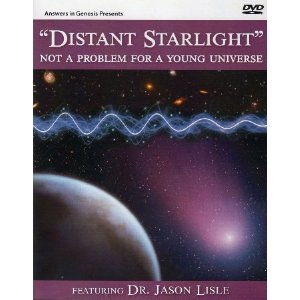I started writing my sci-fi novel in 2009 believing that the earth is young. I never doubted the dimensions in the description of the universe I got from Alex Filippenko in his Introduction to Astronomy, but Jason Lisle’s DVD–Distant Starlight: Not a Problem for a Young Universe–had given me the impression that most astrophysicists just ignore any evidence that doesn’t fit a big bang scenario. Three years ago when I listened to Dr. Lisle talking about Gravitational Time Dilation (GTD), Speed of Light Decay (CDK), and Anisotropic Synchrony Convention (ASC), I believed that he offered legitimate alternatives to Big Bang Cosmology.
Although I know much more about outer space now than I did the first time I heard Dr. Lisle, I’m still not prepared to critique the science of an astrophysicist. (You can find that here, here, and here if you are interested.) And besides, Dr. Lisle’s science is not what cracked the foundation of my young earth view.
After weeks of using the resources of Reasons To Believe, I again watched Distant Starlight: Not a Problem for a Young Universe. I immediately realized that Dr. Lisle does not present Old Earth Creationism honestly because he never examines the scripture that supports it. After listening to podcasts and reading books and articles from RTB, this omission seemed glaring to me because, in contrast, all Reason To Believe scholars take every opportunity to openly engage the arguments, discuss the evidence, and examine the biblical interpretation of YEC. As a result, I have actually learned more about the history and development of Young Earth Creationism through RTB than through YEC resources.
In Distant Starlight, Dr.Lisle builds a case against evolution and a godless big bang theory, but he dismisses out of hand any alternative biblical interpretation. He talks extensively about the science (that many of us will never understand completely), but he takes no time to evaluate the case for an old earth made directly from the word of God (that every believer can understand with the light of God’s Spirit).
Dr. Lisle states “The big bang cannot be harmonized with the Bible. It doesn’t work. They are mutually incompatible. You can’t make them mix.” Thanks to Reasons To Believe, I know that statement is simply false. I don’t understand all the scientific data, but I have no problem understanding RTB’s literal interpretation of the creation account that can harmonize the big bang with the Bible. I see how it does work. I see how the two are completely compatible. I see how the big bang and the Bible can be made to mix quite easily.
Does that prove that the big bang is true? No, it doesn’t. But God calls us to test all things and hold fast to the good (1Thessalonians 5:21), and He promises to generously give us wisdom whenever we ask (James 1:5,6). Like the Bereans, those of us who love the Lord and want to obey all He says are obligated to search His word and allow the Spirit to lead us in all truth rather than to blindly accept the teaching of men.
It was not science that first caused me to doubt the Young Earth position. It was the failure of Young Earth leaders like Jason Lisle and Ken Ham to honestly discuss the scriptural case for an Old Earth. I still wonder why people who love the Lord, honor His word, and trust His Spirit refuse to encourage all creationists to search the scriptures together regardless of what they believe about the age of the earth.
Because I know the Lord blesses us whenever we seek Him in His word, that’s what I’m inviting you to do with me in Grammas’ Guide to the Universe.


